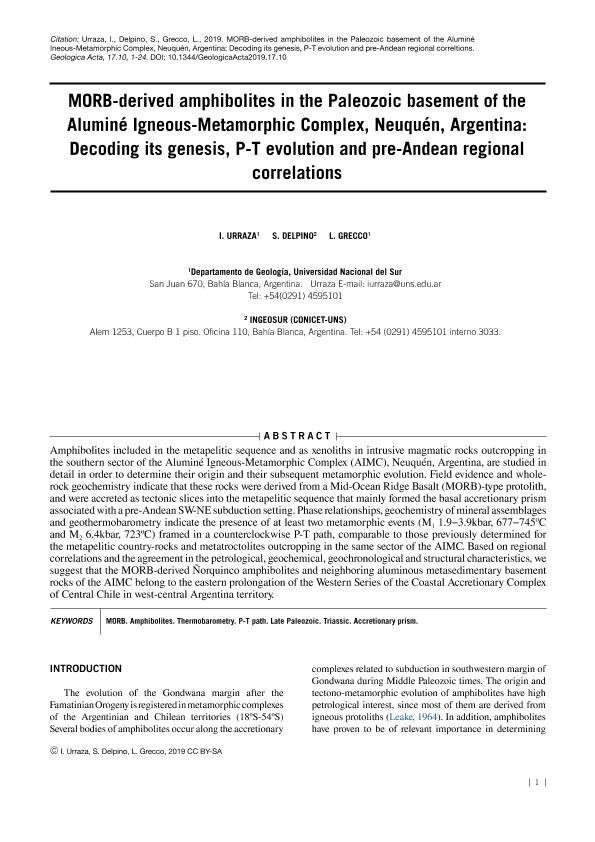Mostrar el registro sencillo del ítem
dc.contributor.author
Urraza, Ivana Alejandra

dc.contributor.author
Delpino, Sergio Hugo

dc.contributor.author
Grecco, Laura Edith

dc.date.available
2020-03-19T13:34:43Z
dc.date.issued
2019-11
dc.identifier.citation
Urraza, Ivana Alejandra; Delpino, Sergio Hugo; Grecco, Laura Edith; MORB-derived amphibolites in the paleozoic basement of the aluminé igneous-metamorphic complex, Neuquén, Argentina: Decoding its genesis, P-T evolution and pre-andean regional correlations; Universidad de Barcelona; Geologica Acta; 17; 10; 11-2019; 1-24
dc.identifier.issn
1695-6133
dc.identifier.uri
http://hdl.handle.net/11336/100169
dc.description.abstract
Amphibolites included in the metapelitic sequence and as xenoliths in intrusive magmatic rocks outcropping in the southern sector of the Aluminé Igneous-Metamorphic Complex (AIMC), Neuquén, Argentina, are studied in detail in order to determine their origin and their subsequent metamorphic evolution. Field evidence and whole-rock geochemistry indicate that these rocks were derived from a Mid-Ocean Ridge Basalt (MORB)-type protolith, and were accreted as tectonic slices into the metapelitic sequence that mainly formed the basal accretionary prism associated with a pre-Andean SW-NE subduction setting. Phase relationships, geochemistry of mineral assemblages and geothermobarometry indicate the presence of at least two metamorphic events (M1 1.9-3.9kbar, 677-745ºC and M2 6.4kbar, 723ºC) framed in a counterclockwise P-T path, comparable to those previously determined for the metapelitic country-rocks and metatroctolites outcropping in the same sector of the AIMC. Based on regional correlations and the agreement in the petrological, geochemical, geochronological and structural characteristics, we suggest that the MORB-derived Ñorquinco amphibolites and neighboring aluminous metasedimentary basement rocks of the AIMC belong to the eastern prolongation of the Western Series of the Coastal Accretionary Complex of Central Chile in west-central Argentina territory.
dc.format
application/pdf
dc.language.iso
eng
dc.publisher
Universidad de Barcelona

dc.rights
info:eu-repo/semantics/openAccess
dc.rights.uri
https://creativecommons.org/licenses/by-sa/2.5/ar/
dc.subject
ACCRETIONARY PRISM
dc.subject
AMPHIBOLITES
dc.subject
LATE PALEOZOIC
dc.subject
MORB
dc.subject
P-T PATH
dc.subject
THERMOBAROMETRY
dc.subject
TRIASSIC
dc.subject.classification
Geología

dc.subject.classification
Ciencias de la Tierra y relacionadas con el Medio Ambiente

dc.subject.classification
CIENCIAS NATURALES Y EXACTAS

dc.title
MORB-derived amphibolites in the paleozoic basement of the aluminé igneous-metamorphic complex, Neuquén, Argentina: Decoding its genesis, P-T evolution and pre-andean regional correlations
dc.type
info:eu-repo/semantics/article
dc.type
info:ar-repo/semantics/artículo
dc.type
info:eu-repo/semantics/publishedVersion
dc.date.updated
2020-02-26T20:09:42Z
dc.journal.volume
17
dc.journal.number
10
dc.journal.pagination
1-24
dc.journal.pais
España

dc.journal.ciudad
Barcelona
dc.description.fil
Fil: Urraza, Ivana Alejandra. Consejo Nacional de Investigaciones Científicas y Técnicas. Centro Científico Tecnológico Conicet - Bahía Blanca. Instituto Geológico del Sur. Universidad Nacional del Sur. Departamento de Geología. Instituto Geológico del Sur; Argentina
dc.description.fil
Fil: Delpino, Sergio Hugo. Universidad Nacional del Sur. Departamento de Geología; Argentina
dc.description.fil
Fil: Grecco, Laura Edith. Consejo Nacional de Investigaciones Científicas y Técnicas. Centro Científico Tecnológico Conicet - Bahía Blanca. Instituto Geológico del Sur. Universidad Nacional del Sur. Departamento de Geología. Instituto Geológico del Sur; Argentina
dc.journal.title
Geologica Acta

dc.relation.alternativeid
info:eu-repo/semantics/altIdentifier/doi/https://doi.org/10.1344/GeologicaActa2019.17.10
dc.relation.alternativeid
info:eu-repo/semantics/altIdentifier/url/http://revistes.ub.edu/index.php/GEOACTA/article/view/GeologicaActa2019.17.10
Archivos asociados
